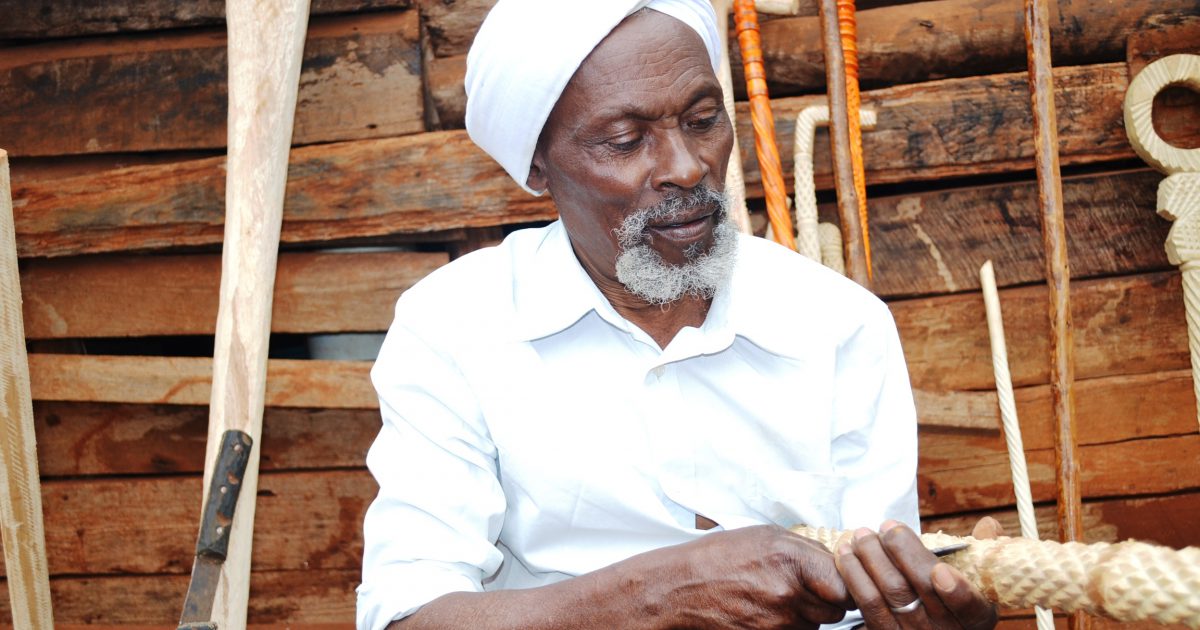Walking sticks
Thika, Monday January 15, 2018 KNA
In many cultures there are items and ornaments which show the class and status of an individual and they include but not limited to fly whisks, walking sticks, attire, necklaces, rings and Rungus.
In the Kikuyu community, a walking stick is a source of respect and men who own walking sticks are adored depending on the design and decorations of the walking stick.
Walking sticks were used by men to point at things, people and as pillars of support as they walked.

In many cultures it was a bad omen for a man to point at someone using fingers; in fact, such would amount to an irreversible curse and thus the use of walking sticks.
To ensure that walking stick tradition does not die, a 70-year-old man in Nyamathumbi village, Gatundu North has been passing his craft to generations.
Meet Samuel Kimani Ndung’u an artist who commenced the craft of making and decorating walking sticks in the 80’s.
The seemingly trivial job has seen him feed his family and educate all his children to university levels and continues being the source of livelihood for his family.
Kimani who was not taught by anyone the art of making walking sticks said that he discovered his inborn talent as he was trying out different designs on the walking sticks. “As the new curriculum which emphasizes on talent is being rolled out, I am very happy because there are many talents which are going to waste as they are not discovered. Were it not for my adventurous nature my talent would also have gone to waste,” explained Ndung’u.
Ndung’u said that his first prominent client was Ngengi wa Muigai when he was the Member of Parliament for the larger Gatundu constituency and still does make the walking sticks for him. “When Ngengi asks for the walking stick, he gives me a token of appreciation of up to Sh 20, 000,” he explained.
Speaking to KNA Kimani explained that he uses fresh hardwood from deciduous trees to make his walking sticks, trees he says are best for they are less gummy. “Using a panga, screwdriver, and a designer machine, whittle the bark from the stick, revealing the bright wood beneath.
The craftsman must be patient enough while doing this, especially when working around knots,” he said revealing that a complete walking stick can take him a whole five days to craft. “After whittling the bark, carve a head for the stick, if need be. Using a pencil, draw on the nose, eyes and mouth, then slowly and carefully use the tip of the knife to bring out the details. This part of the work if rushed, may end up slipping and one cutting himself,” he warns.
To shield the bottom end of a walking stick from splintering, he advises that one should whittle it down until the piece of copper pipe slips snugly onto it. “Once the walking stick is ready for use, carve it to a smoother finish and apply a protective coat, you’ll need to let it dry indoors for a few days. Use sandpaper to smoothen its surface,” he says adding that the final stage should be decoration of the walking stick which he notes should not exceed one day.
Ndung’u said that he not only sells the walking sticks but gives them to prominent personalities. In the just concluded campaign period, he gave walking sticks to the now Kiambu governor Ferdinand Waititu, his deputy James Nyoro, real estate magnate David Ngaria alias Gakuyo and the Juja MP Francis Munyua Waititu. “I have made a walking stick for both President Uhuru Kenyatta and his deputy William Ruto but the only challenge is how to access them,” he said calling on anyone who can assist him to give the walking sticks to the two leaders to come forward.
Ndung’u said that he faces many challenges like the lack of a proper market for the walking sticks as only one shop- Kendia limited- in Thika has agreed to stock his art work. “The government should assist the artists to open curio shops in major commercial towns where they can market their work,” pleaded Ndung’u. “Some of the other challenges I face is that I buy the trees so if I don’t have money I cannot make them.
There are times that I cut myself with the curving knife and can stay for months without working as I wait to heal,” he explained. Lydia Wanjiru the wife said that she is happy with the husband’s job since it is able to provide for their basic needs. “Apart from the cuts he gets while on his art-work, the job is good because he is able to provide for the family. As for me I suffer from blood pressure and diabetes and the work is still able to cater for my medication,” said Wanjiru.


